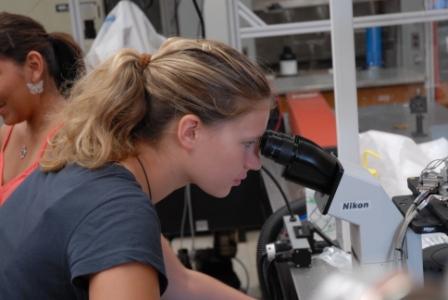Professor Miller’s research group has one or two research positions open for undergraduates with an interest in physical chemistry and a strong mathematical background.
The group’s research focuses on the spectroscopic detection and characterization of reactive chemical intermediates. These molecules play critical roles in a variety of processes of significant importance to our society and economy, examples of which include combustion, atmospheric and interstellar chemistry, plasmas and reacting flows. Recent analytical work in my group has involved the simulation of observed electronic-absorption spectra of HO2 free radicals. These simulations allow the determination of HO2 concentrations that are critical to the understanding of the kinetics of electrical discharges, atmospheric shock waves, and various non-equilibrium, reacting flows. Other work focuses on analysis of spectra of larger polyatomic molecules, typically free radicals and often of high symmetry, with emphasis on the utilization of quantum chemistry calculations. This work involves understanding and calculating the extent of various interactions affecting the spectral structure typical of open-shell, free-radical spectra, such as the breakdown of the Born-Oppenheimer approximation, vibronic coupling, conical interactions, and the Jahn-Teller effect.
Dr. Miller’s group specializes in theoretical/computational work. However, they maintain active collaborations with experimental groups in Engineering at Ohio State and Chemistry at the University of Louisville as well as a strong collaboration with a theoretical group, highly skilled in electronic structure calculations, at the University of Florida.
Research support is provided from an OSU Advancement fund. This funding is normally reserved for the summer, but class credit, e.g., CHEM 4998H, can be earned for research during the academic year. This undergraduate program has been on-going for several years. The undergraduates involved typically make research presentations at more than one international meeting and prepare a senior thesis. So far all have been a co-author on a research publication. One student is scheduled to graduate this spring; previous graduates are now working for their Ph.D.’s in Chemistry at M.I.T. and UC, Berkeley.
Interested students should email Professor Miller (miller.104@osu.edu) and include a brief summary of their relevant experience, including class work. The plan would be for the selected students to participate in undergraduate research during spring semester and then have a research position funded for the summer.


